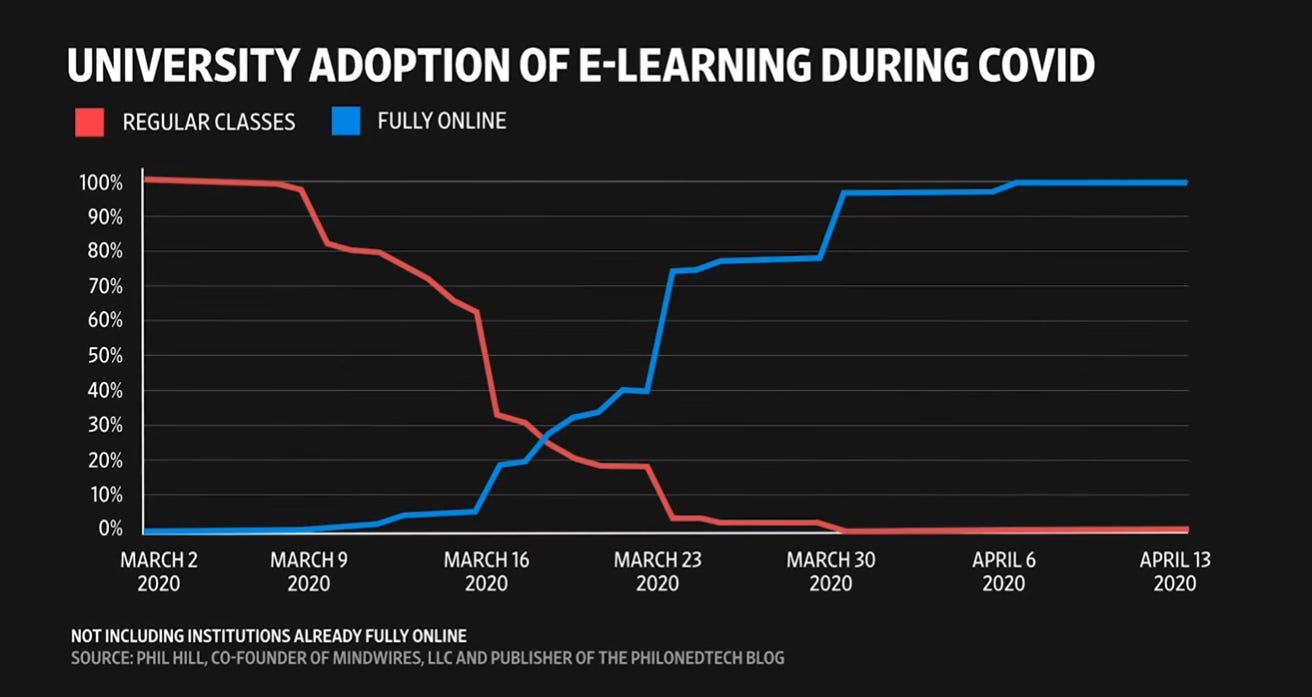The Way We Learn Might Change Forever?
The Pandemic led to the shutting down of our education system overnight. Some universities have shifted their course work online while some decided to stop the semester completely. With no time to prepare for such a drastic change, Most are finding it hard to accept the new way of learning. Universities all over the world see record low numbers in enrollment with multiple cases of students asking for a refund of the tuition fees they paid for classes on campus.

Stats for USA, Source: Wall Street Journal, Phil Hill, Mind Wires
With the current trends in the COVID cases, Bryan Alexander, an Education Futurist, suggest that there are three possibilities for the future of education.
The Spread declines over the next few months and universities resume back to in-person classes. This will largely depend on how the numbers change over the next few months and will vary by states and regions.
The numbers continue to rise, and the next semester is conducted entirely online. Many universities across the world have already announced that they will be shifting their courses work completely online for the next semester.
The Pandemic continues, and the universities operate in a ‘toggle’ term with having partial classes online and some in-person depending on the situation. This might also mean that the classes might be in person for some students, while some will have to do with online courses.
Despite the promising claims, the online mode of education does see some fundamental issues.
Infrastructure — lack of infrastructure to carry out the course work online along with a good internet connection to have a comparable in-class uninterrupted experience.
Student Teacher Connect— Majority of students and teachers claim to not have a good connect and engagement in the online mode.
Evaluation and hands-on Courses — Universities have been struggling to find a suitable evaluation method, especially for courses that have a hands-on component
Peer to Peer Engagement — This is often considered as one of the most crucial aspects of learning, and despite being fairly accustomed to the online generation, students have not been very comfortable in the online mode of learning.
Productivity and Mental Health — Not being used to the home environment for classes, plenty of students find it harder to focus on studying while at home. Additionally, The online mode of education makes it harder to draw a line to separate work and non-work hours.
Organizations all over the world have been trying hard to resolve these issues, and many exciting solutions have come up in the last few months. The Pandemic has led to the tremendous growth of platforms and online learners, and many anticipate even bigger growth for the future.
What else might change?
Cost of Education — With the new method, and decreased operational spending from universities, students are expecting much lower tuition for online degrees.
Scalability and Class sizes — Enabled by technology, We might see much bigger and more flexible classes in the future.
Evaluation Patterns — In trying to catch up with the new online mode, Universities are trying to find technology solutions and even considering to change the entire system of evaluation.
I have been trying to understand the transition of students to online classes via a survey. It would be great if you could take 2-minutes to fill it. Click here.
Thanks in advance, happy learning!
You can find me on LinkedIn here.



